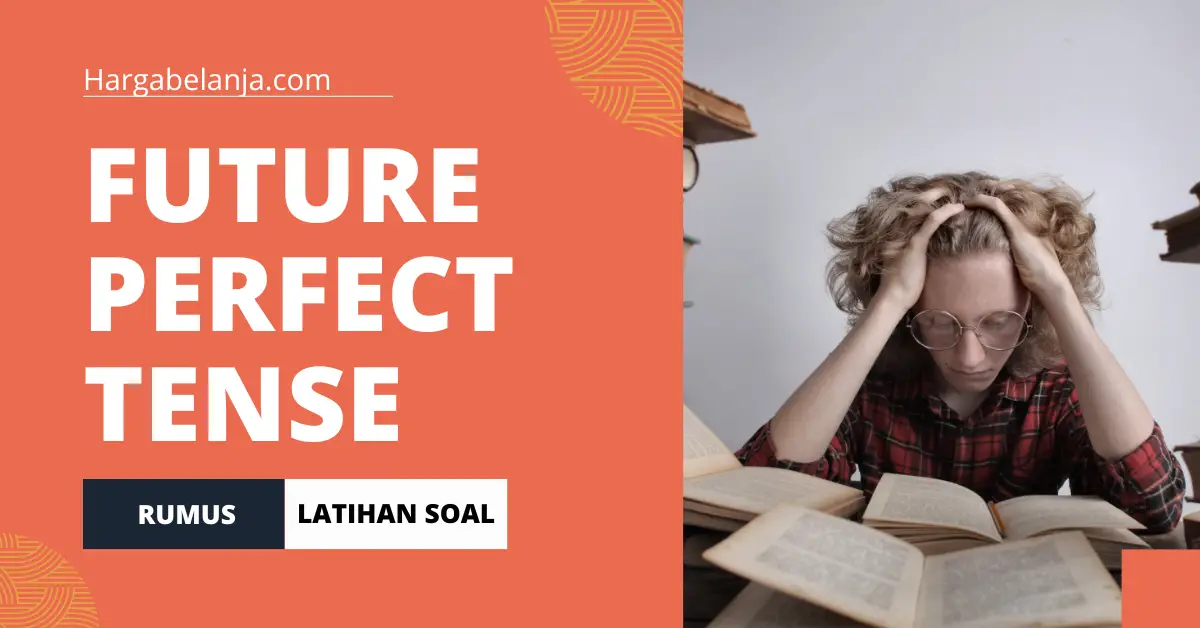Apa rencanamu minggu depan? Pergi liburan, mengikuti tes TOEFL, atau nonton Netflix di rumah? Bila kamu berencana pergi liburan, maka kamu mungkin sudah membeli tiket ke Bali esok hari. Dalam bahasa Indonesia, kamu bisa berkata:
Aku bakalan udah beli tiket besok pagi.
Well, kamu bisa mengungkapkan rencana tersebut dalam Future Perfect Tense lho. Jadinya seperti ini:
I’ll have bought a ticket to Bali by tomorrow morning.
Tak hanya kegiatan di masa mendatang, kamu juga bisa membicarakan aksi / peristiwa di masa lalu menggunakan Future Perfect Tense ini. Eh yang bener? Iya dong, coba simak pembahasan berikut sampai tuntas.
Apa itu Future Perfect Tense?

Future Perfect Tense merupakan tenses yang digunakan untuk membicarakan aksi / peristiwa yang diharapkan sudah selesai / sudah terjadi di masa depan. Contohnya:
- Hi, I’m Bio. By the time I’m 23, I will have a nice job. I will have got married and had three children by the time I’m 27. And, by 50 I will have retired to a comfortable cottage in the countryside.
Disini Bio menjelaskan bahwa saat menginjak usia 23, ia akan sudah memiliki pekerjaan yang baik. Ia akan sudah menikah dan punya tiga anak saat usianya 27 tahun. Kemudian, pada saat usianya 50 tahun, ia akan sudah pensiun dan tinggal di sebuah rumah yang nyaman di luar kota.
Lantas, bagaimana penggunaan Future Perfect Tense untuk masa sekarang (present) dan masa lalu (past)? Sebelumnya simak dulu rumus Future Perfect Tense berikut ini.
Rumus Future Perfect Tense
Subject + will + have + verb 3 (kalimat positif)
Subject + will + not + have + verb 3 (kalimat negatif)
Will + subject + have + verb 3? (kalimat tanya)
Seperti tenses lainnya, Future Perfect Tense mengenal beberapa singkatan (contractions) seperti:
- I will = I’ll (berlaku juga untuk subject lainnya: you’ll, they’ll, she’ll, he’ll, we’ll)
- Will not = won’t
Adapun, time phrases yang sering digunakan dalam Future Perfect Tense adalah: by the time, by (year/month/season/event), by this time next year, in month/year, in (time period’s) time.
Future Perfect Tense untuk Masa Sekarang (Present) dan Lampau (Past), Maksudnya Gimana Sih?
Selain digunakan untuk menjelaskan aksi / peristiwa yang akan sudah beres di masa depan, Future Perfect Tense juga dapat digunakan untuk menjelaskan aksi / peristiwa di masa sekarang maupun masa lalu. Coba perhatikan teks yang telah dimodifikasi dari versi orisinalnya (BBC English) di bawah ini.
Baki is a traveler, not a tourist. She loves exploring new places and getting to know the locals. By the time she gets back in 3 months’ time she will have been away for nearly 3 years.
She doesn’t really do social media: she prefers old-fashioned postcards and letters and what she calls “proper” photographs. She’s terrible at keeping in touch, so I don’t know where she is at the moment, but she did let me know her travel plans before she left and she usually sticks to them. By now she’ll have visited at least a dozen countries. She’ll have crossed deserts and mountains and if she’s following her schedule she’ll have flown into Bali last week.
Mari soroti bagian yang ditulis dalam Future Perfect Tense, kemudian analisis bersama-sama.
- By the time she gets back in 3 months’ time she will have been away for nearly 3 years.
- By now she’ll have visited at least a dozen countries. She’ll have crossed deserts and mountains.
- If she’s following her schedule she’ll have flown into Bali last week.
Perhatikan bahwa dari ketiga kalimat di atas, hanya satu yang menunjukkan aksi / peristiwa di masa depan, yakni bagian:
- By the time she gets back in 3 months’ time she will have been away for nearly 3 years. (Pada saat ia kembali dalam tiga bulan mendatang, ia akan sudah pergi selama hampir 3 tahun)
Sementara, bagian kedua membicarakan aksi yang diyakini akan sudah terjadi sekarang (present time). Kuncinya terdapat pada kata by now. Perhatikan baik-baik kalimatnya:
- By now she’ll have visited at least a dozen countries. She’ll have crossed deserts and mountains. (Sekarang, ia akan sudah mengunjungi setidaknya se-lusin negara. Ia akan sudah melintasi beberapa gurun dan gunung).
Adapun bagian ketiga membicarakan aksi / peristiwa yang diyakini akan sudah terjadi di masa lalu (past time). Hal ini karena ada keterangan last week pada kalimat tersebut. Coba perhatikan lagi:
- If she’s following her schedule she’ll have flown into Bali last week. (Kalau ia mengikuti jadwalnya, ia akan sudah terbang ke Bali pekan lalu)
Bagaimana, sudah lebih jelas? Biasanya penggunaan Future Perfect Tense untuk present time maupun past time dilakukan oleh orang lain (bukan subyek yang sedang dibicarakan).
Contohnya pada teks diatas. Si pembicara sedang menceritakan temannya yang bernama Baki. Ia membicarakan aksi / peristiwa yang diyakini sudah dilakukan Baki karena si pembicara mengetahui rencana perjalanan Baki.
Jadi sebenarnya si pembicara tidak tahu persis apakah dugaannya tentang Baki benar atau tidak, yang jelas ia hanya berasumsi. Tetapi, asumsinya didasarkan pada jadwal Baki – yang ia ketahui dengan baik. Hal ini seperti yang ditunjukkan kalimat berikut.
- …. But she did let me know her travel plans before she left and she usually sticks to them. (Tapi, ia [Baki] memberitahuku rencana perjalanannya sebelum ia pergi dan ia biasanya mengikuti rencana tersebut).
Bagaimana, sudah jelas?
Contoh Kalimat Future Perfect Tense
Selanjutnya mari simak 15 contoh kalimat Future Perfect Tense berikut ini.
- I will have done it by then.
- I will not have finished my report by this time next week.
- Will you have read all the articles by the end of the day?
- Four years from now we’ll have been together for a decade.
- In July I’ll have been out of work for three months.
- Will she have finished painting all the rooms by next week?
- By the time she finishes her shower, I’ll have finished my work so we can go straight out.
- Next week we’ll have known each other for three years.
- This time next year he’ll have completed his course so we can go traveling then.
- We predict next month our profits will have doubled.
- Won’t you have arrived by 7 p.m?
- Will you have eaten when I pick you up?
- By the time you read this letter, I will have gone to Yogyakarta.
- Baki won’t have finished her homework at 7 p.m.
- You’ll not have finished the report by tomorrow morning.
Untuk menguji pemahamanmu, mari kerjakan latihan soal berikut ini.
Soal Future Perfect Tense – Section 1
1. Mum will have arrived by now. She said her plane was on time. Is the sentence correct or not?
A. correct
B. not correct
2. By next week they will have been married yesterday. Is the sentence correct or not?
A. correct
B. not correct
3. By the time you see me next I will have had the baby. Is the sentence correct or not?
A. correct
B. not correct
4. Last year I will have been to Bali on my holiday. Is the sentence correct or not?
A. correct
B. not correct
5. I don’t think you should call. It’s only seven. She won’t have woken up yet. Is the sentence correct or not?
A. correct
B. not correct
Jawaban Soal Future Perfect Tense – Section 1
1. Mum will have arrived by now. She said her plane was on time. Is the sentence correct or not? A. Correct, karena si pembicara berasumsi berdasarkan informasi yang ia ketahui, yakni ibunya bilang pesawatnya tepat waktu. Meskipun begitu, ia tidak tahu persis apakah dugaannya benar atau tidak.
2. By next week they will have been married yesterday. Is the sentence correct or not? B. Not correct, karena terdapat dua time phrases yang saling berlawanan, yakni future vs. past time (next week vs. yesterday)
3. By the time you see me next I will have had the baby. Is the sentence correct or not? A. Correct, karena time phrase dan jenis verb yang dipakai sesuai aturan Future Perfect Tense.
4. Last year I will have been to Bali on my holiday. Is the sentence correct or not? B. Not correct, kalimat ini adalah sebuah kalimat asumsi. Kalimat ini menjadi salah karena si pembicara adalah subyek dalam kalimat tersebut, padahal seharusnya ia tahu kemana ia pergi saat liburan tahun lalu. Jadi, ia tidak perlu berasumsi (tidak perlu menggunakan Future Perfect Tense untuk berasumsi).
5. I don’t think you should call. It’s only seven. She won’t have woken up yet. Is the sentence correct or not? A. correct, karena si pembicara berasumsi bahwa orang tersebut masih tidur, maka ia dapat menggunakan Future Perfect tense untuk mengungkapkan asumsinya.
Soal Future Perfect Tense – Section 2
Susunlah kata-kata acak berikut menjadi kalimat Future Perfect yang baik dan benar. Kata yang diberi tanda titik harus berada di akhir kalimat.
- Have – you – to – by – the – he’ll – bed. – gone – get – home – time (clue: kata pertama by)
- you – started. – late, – are – will – film – the – have – if (clue: kata pertama if)
- House – will – by – moved – spring. – we – have (clue: kata pertama we)
- From – paid – have – we – years – will – the – mortgage. – off – now – seven (clue: kata pertama seven)
- Predict – we – our – will – have – profits – 2018 – doubled. – by (clue: kata pertama we)
Jawaban Soal Future Perfect Tense – Section 2
Berikut adalah jawaban dari soal di atas.
- By the time you get home, he’ll have gone to bed.
- If you are late, the film will have started.
- We will have moved house by spring.
- Seven years from now we will have paid off the mortgage.
- We predict by 2018 our profits will have doubled.
Itulah beberapa soal Future Perfect Tense dan jawabannya. Berapa soal dapat kamu jawab dengan benar? Jika merasa belum paham dengan materi ini, kamu bisa membaca kembali artikel kami, bertanya pada guru, atau belajar bersama teman-teman.
Selain Future Perfect Tense, ada juga lho jenis tenses lain. Kamu bisa menyimaknya disini. Jika butuh hiburan kamu juga bisa membaca contoh story telling lengkap dengan terjemahannya di Hargabelanja.com. Selamat belajar!



